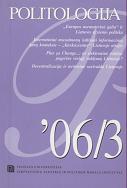„Europos normatyvinė galia“ ir Lietuvos užsienio politika
'Normative Power Europe' and Lithuania's Foreign Policy
Author(s): Gražina MiniotaitėSubject(s): Politics / Political Sciences
Published by: Vilniaus universiteto leidykla & VU Tarptautinių santykių ir politikos mokslų institutas
Summary/Abstract: The article deals with the specific features of the construction of an international identity by the EU and Lithuania. We do this by comparing the narrative of “Normative Power Europe” to that of “Lithuania, the regional center”. The term “Normative Power Europe”, though in use for some two years, still has no clearcut place in the studies of European integration. So in the article we first try to explicate its content by drawing a contrast with the more familiar concept of “civil power”. We show that the term is an attempt at a new conceptualization of a problem that has been on the agenda of constructivist international relations studies for some time already, namely, that of the power of ideas in international politics. “Normative Power Europe” is defined as a discursive practice, as a narrative shaping the EU as a unique political institution which, by realizing itself via free exchange of ideas and opinions, is capable of changing the “normalcy” perception in international relations. In the EU political discourse the identity of EU as a normative power is constructed via the contrast of EU / USA politics, with America conceived as Europe’s “Other”. A brief examination of the narrative “Lithuania, the regional center” shows its similarity to the narrative of “Normative Power Europe”. The conclusion is that the narrative of “Lithuania, the regional center” is merely a nationalist replica of the “Normative Power Europe”, with some peculiarities to be explained by differences in historical context and Lithuania’s specifics in domestic politics. These are mainly due to Lithuania’s attempt at reconciling her nation state identity and the ambitions of an active actor of the EU Common Foreign and Security Policy.
Journal: Politologija
- Issue Year: 2006
- Issue No: 3(43)
- Page Range: 3-19
- Page Count: 17
- Language: Lithuanian

